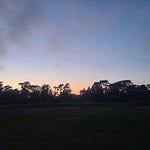As my playwriting professor Deb Margolin used to say, there are only five original things you can say, and they’ve already been said. Artists, philosophers, scientists — all of us! — have been batting around the same questions for centuries: What constitutes a meaningful life? What constitutes a good life? What do we owe each other? What happens when we die? Does God exist? What is love? What is desire?
These are nothing new. Philosophers discuss, artists express, scientists research, and we all wonder, publicly or privately, over and over again or maybe just once. None of us answer, not really, not forever, not for everyone. So we keep asking and we keep exploring.
Yes, Deb used to say that there are only five original things to say, and they’ve already been said. But she also used to say: the only original thing left is the desire to speak.
That desire — that thing that compels you to create, that moves you to move — is wholly original. Definitionally, no one else experiences that exact same desire, because no one else is me, and I am no one else but me.
That desire cannot be replicated, not only person to person, but even within the same person. Time continuously passes, so we are all always changing, so my desire to speak at one moment is different from my desire to speak at another. The me I am right now is different than the me I am by the end of this sentence, and the same goes for the you reading this sentence. So when I explore one of those big questions, it is original; that question has been explored before, certainly, but even if by me, never before by this me, the one who desired to speak right here and right now. I have landed on different answers to these questions over the course of my life, prompted by different desires to speak, and I imagine I will continue to have different ones as I continue being alive.
A few days ago, I learned that Fyodor Dostoevsky, author of Crime and Punishment, read Miguel de Cervantes’ Don Quixote. This may not sound like a big deal, but let me tell you — there are only two books I’ve loved so much I read them twice: Crime and Punishment and Don Quixote. So when I learned that my favorite author read my favorite author, I reacted like any normal person would — I jumped out of my seat at the dining room table, and squealed aloud to an empty apartment (save for our cats): no way!
And Dostoevsky didn’t just read Don Quixote; he was a fan. Dostoevsky wrote, in a letter to his niece, about his desire to write his own Don Quixote, his own “positively beautiful man”, who was beautiful only because he was ridiculous. Dostoevsky desired to speak, and so he wrote The Idiot, widely regarded as his version of Don Quixote.
To value originality above all else is to devalue repetition, revisiting, another look, a slower look. Valorizing originality allows us to celebrate how different a person’s perspective might be, which I love!, but I’m equally interested in the ways in which we are, if not the same, then similar.
I walk the same loop through Prospect Park almost everyday. My legs know by heart the slight slope that leads to the lake. My eyes know how the leaves canopy over that path, green in spring, sweltering in summer, rusted in fall, barren in winter. One time I saw a red-shouldered hawk, but for the most part, I see the same birds over and over.
Centuries later, I ask the same questions as Cervantes, as Dostoevsky.
What do we hear when we listen to something that’s already been said? What do we discover when we explore something that’s already been explored?
What are the questions we return to? Why do we return to them? To what extent are those questions answerable?
There’s something I didn’t tell you yet, which is how I came to learn that Dostoevsky read Don Quixote. I need you to know that nowadays, Don Quixote is presented as one book, with two parts, set eight years apart from each other. But it wasn’t originally written that way. Cervantes wrote and published Part I, all by itself, in 1605. It became so popular that other people started writing their own Part II’s, passing them off as the second segment of the Quixote. In other words: fan fiction — unoriginal, derivative, poor facsimiles of Cervantes’ work. Maybe these authors wanted to capitalize on the book’s popularity, maybe they missed the knight errant, maybe they just really needed to know what happened next.
Eventually, the various Part II’s made their way back to Cervantes. To set the record straight, he wrote his own Part II — the real Part II. In his Part II, Cervantes introduces new characters who are familiar with Part I, so they know all about Don Quixote, Sancho Panza, and everything else from the first segment.
If Part I is mostly a series of hilarious, winding misadventures, Part II is a nuanced exploration of how to be a person. It’s hard for me to imagine the novel without Part II, because so much of the meat of the book is in that second part — a part that wouldn’t exist if not for fan fiction and people pretending to be someone they weren’t. Hundreds of years after the fact, the novel is presented as one work with two parts.
I started reading Dostoevsky’s The Brothers Karamazov a few days ago. In the introduction, Dostoevsky explains that the book is presented in two parts, set about a decade apart. Just like Don Quixote, I thought. That’s what made me wonder: could Dostoevsky have read Don Quixote? That’s what made me discover: yes! he had!
So, to answer the question at hand: am I original? God I hope not.














Share this post